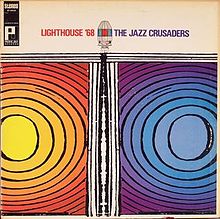
Requisites
Lighthouse ’68 is a live album by The Jazz Crusaders recorded on November 10-13, 1967 at the Lighthouse in Hermosa Beach, California and released the following year on the Pacific Jazz label. Lighthouse ’68 documents the group performing live at one of the premier West Coast clubs, The Lighthouse Café, opened in 1949.
The producer on the date was Richard Bock. The cover design was created by Gabor Halmos, the engineer was Dino Lappas, the liner notes were written by Howard Rumsey, and the liner photography was taken by Fred Seligo.
The Tracks | 44:33- Ooga-Boo-Ga-Loo (Stix Hooper) – 6:39
- Eleanor Rigby (John Lennon, Paul McCartney) – 7:32
- Native Dancer (Buster Williams) – 8:52
- Never Had It So Good (Joe Sample) – 7:15
- The Emperor (Buster Williams) – 8:50
- Impressions (John Coltrane) – 6:12
- Wayne Henderson – trombone
- Wilton Felder – tenor saxophone
- Joe Sample – piano
- Buster Williams – bass
- Stix Hooper – drums
Review by Eddie Carter
Four friends from Houston, Texas who began performing locally in 1956 were Wayne Henderson, Wilton Felder, Joe Sample, and Stix Hooper. They were originally known as The Swingsters, then The Nite Hawks, but after moving to Los Angeles, California in 1961, they changed their name and became one of the best West Coast ensembles of the sixties, The Jazz Crusaders.
The set opens with Oogo-Boo-Ga-Loo, an infectiously danceable audience grabber by Stix Hooper which begins with a lovely introduction by the trio, then blossoms into a sanctified styled theme treatment. John Lennon and Paul McCartney’s Eleanor Rigby allows their midtempo rendition to explore the melody collectively. The tempo moves up for Native Dancer, the first of two contributions by Buster Williams which gets off to a roaring start with an aggressive opening statement and nimble melodic presentation.
Sample’s Never Had It So Good starts the second side with an easy spirited beat that leads us back to church with a bit of boogaloo in the imaginative display of harmony during the group’s opening melody. The Emperor, is Williams’ second offering to the session that takes us back to straightforward bop with the solos in the same order as the previous tune.
The album ends with John Coltrane’s Impressions, takes an invigorating introduction by the trio and theme statement led by the horns followed with a jet-propelled interpretation infused with searing fire for an energetic workout and effervescent ending.
Source: Jazztracks by Eddie Carter | Excerpt: 12/2018 | atlantaaudioclub.org
More Posts: choice,classic,collectible,collector,history,instrumental,jazz,music


